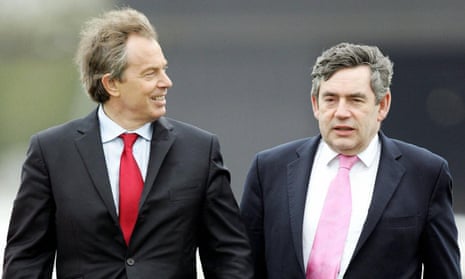Boris Johnson may be prime minister, but over on BBC iPlayer there’s a Labour government. For five hour-long sessions, those fed up with life in a country now in its 12th consecutive year under a Tory leader can wallow in an alternative reality where it’s Labour that wins and wins and wins.
The opportunity comes via the documentary series Blair & Brown: The New Labour Revolution, which tells how the party went from the landslide defeat of 1983 to the landslide victory of 1997 and the story of the following 13 years in government. For those who contemplate the politics of 2021 and wish things would only get better, that first, winning episode is pure TV escapism: it’s Strictly for nerds.
It’s rivetingly done, offering all sorts of nostalgic pleasures to those old enough to remember the Britain of a quarter-century ago. But it provides more than just a dip in the warm bath of memory. It also delivers a sharp reminder of the differences between then and now – which, for those longing for a Labour government, is a much gloomier experience.
Because what it rapidly confirms is that the hole the party is in today is so much deeper than the one Tony Blair and Gordon Brown confronted when they insisted that only wholesale transformation would deliver victory. When Blair took over in 1994, Labour faced an exhausted Conservative party whose Commons majority was dwindling to zero. Back then, government incompetence exacted an immediate price: after the financial meltdown of Black Wednesday, Tory poll numbers plummeted. And Labour had a solid base of safe seats in Scotland and northern England that it could build on.
None of those conditions pertain now. While the Tories’ fourth consecutive election win in 1992 slashed their majority to 21, the equivalent win in 2019 boosted their majority to 80. The serial incompetence of the government’s botched Brexit and its mishandling of the pandemic – its early phase was this week branded one of the worst public health failures in British history by two Tory-chaired Commons committees – has brought no discernible reckoning in the opinion polls. On the contrary, the party remains comfortably ahead. As for Scotland, it turned SNP yellow long ago, and in England the once “red wall” is bright blue.
Below the surface, the landscape is equally inhospitable – and worse today than it was then. At one point, Blair tells the documentary makers that “the single most important thing in politics is to have the initiative” to set the agenda. In his day, that was relatively straightforward, and we see the process in action: spin doctors nobbling political editors to frame the story the way the party wanted. Half a dozen front pages later and the narrative was set, with MPs instructed to stick to it. It doesn’t work like that in the era of social media. All it takes is one Twitter eruption and suddenly the entire Labour tribe is talking about something else.
That’s partly because Labour is culturally further out of step with what analysts like to call “the median voter” than it was then. The US data whiz David Shor has spotted the same trend in multiple countries, as traditionally social democratic parties become increasingly dominated by the concerns of the “hyper-educated” left, concerns not shared by the wider public. That leaves space for parties of the right to offer themselves as the voice of the mainstream – in tune with the less educated, lower-income voters that used to be beyond their reach. Donald Trump did that in the US, and Johnson is doing it in the UK.
There’s a less tangible measure too. The Labour party of the mid-1990s was truly sick of losing, and ready to do whatever it took to win. Blair joked at the time that this may have been the only reason so many Labour members voted for him. They had had enough of the internal battles; they were ready to look outward and adapt to the electorate. Across the party, there was a consensus that their earlier detour to the ideological fringes had been a costly mistake.
But that argument has not been settled in today’s Labour party. It was telling that in his conference speech, Keir Starmer had to set out all over again the case that Neil Kinnock had spent a decade making in advance of Blair, persuading Labour that principles are useless without power – that you do nothing for the people who desperately need a Labour government by sticking to a path guaranteed to end in defeat. Power was “the object of the exercise”, Starmer said – a statement of the obvious that no Tory leader has ever needed to make.
But if the hole is so much deeper now than it was back then, what about those charged with climbing out? Blair & Brown is a reminder that a party that could then count its victorious leaders on the fingers of one hand – with a couple of fingers and a thumb to spare – was suddenly blessed with two unusually gifted politicians at the same time. There were some other genuine heavyweights around that shadow cabinet table too. Today’s team does not inspire the same confidence (though there are some big hitters on the backbenches who are left mystifyingly unused).
Still, it’s a mistake to look for history to repeat itself. There will be no rerun of 1997. Labour cannot rest its hopes on the appearance of an electoral magician: they come around too rarely. Instead it has to learn, and even take comfort from, its opponents. The Conservatives have not had a leader who could hold a candle to Blair or Brown since Margaret Thatcher – but they’ve won anyway, again and again. Labour doesn’t need to believe in miracles: it needs to learn to win without them.
Jonathan Freedland is a Guardian columnist

